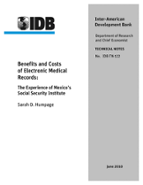Benefits and Costs of Electronic Medical Records: The Experience of Mexico's Social Security Institute
Date
Jun 2010
Electronic medical record (EMR) systems are increasingly used in developing countries to improve quality of care while increasing efficiency. There is little systematic evidence, however, regarding EMRs' benefits and costs. This case study documents the implementation and use of an EMR system at the Mexican Social Security Institute (IMSS). Three EMR systems are now in operation for primary care, outpatient and inpatient hospital care. The evidence suggests that the primary care system has improved efficiency of care delivery and human resources management, and may have decreased incidence of fraud. The hospital systems, however, have lower coverage and are less popular among staff. The greater success of the primary care system may be due to greater investment, a participatory development process, an open workplace culture, and software appropriately tailored to the workflow. Moving forward, efforts should be made to exploit data housed in EMRs for medical and policy research.



